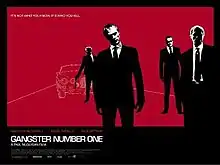Gangster No. 1
Gangster No. 1 is a 2000 British crime drama film directed by Paul McGuigan and starring Paul Bettany in the title role. It is based on the play Gangster No.1 by Louis Mellis and David Scinto,[2] and features Malcolm McDowell, David Thewlis and Saffron Burrows.
| Gangster No. 1 | |
|---|---|
 Theatrical release poster | |
| Directed by | Paul McGuigan |
| Produced by | Norma Heyman Jonathan Cavendish |
| Screenplay by | Johnny Ferguson Louis Mellis David Scinto[1] |
| Based on | Gangster No.1 (play) by Louis Mellis David Scinto |
| Starring | |
| Music by | John Dankworth |
| Cinematography | Peter Sova |
| Edited by | Andrew Hulme |
Production company | FilmFour Productions Pagoda Film and Television Corporation Road Movies Filmproduktion British Screen Productions British Sky Broadcasting Filmboard Berlin-Brandenburg (FBB) NFH Productions Little Bird |
| Distributed by | FilmFour |
Release date | 9 June 2000 |
Running time | 103 minutes |
| Country | United Kingdom |
| Language | English |
| Box office | $30,915 |
Plot
The film opens with an unnamed British veteran gangster attending a boxing match with friends. Hearing in conversation that another gangster, Freddie Mays, is to be released from prison after 30 years, he falls silent and leaves the table to recover his composure.
The narrative flashes back to the 1960s, showing a younger Gangster. He comes to the attention of an influential London gangster, Freddie Mays (Thewlis), who recruits him as an enforcer. The Gangster is eager to please; his violence impresses Mays and he proves his loyalty with creative methods of murder. However, the Gangster from the start is obsessed with and jealous of Mays' success and glamorous lifestyle, demonstrated in his luxury clothing and plush flat.
The Gangster discovers that Mays' rival, Lennie Taylor, is planning to kill Mays. Instead of warning him, the Gangster decides to let the attack take place, and kills the only other member of his gang who is aware of the plan. The Gangster watches as Taylor and his gang shoot and stab Mays, and slit the throat of his fiancée, Karen. Later that night, the Gangster goes to Taylor's flat, shoots him in the leg and tortures him to death.
The Gangster discovers the following day that Mays did not die but was hospitalised. Mays is unjustly convicted of ordering Taylor's murder and sent to prison for 30 years. With Mays out of the way, the Gangster assumes leadership of the gang and consolidates his position. In a sequence spanning the years between 1968 and 1999, he is shown organizing a bank heist, opening a casino, fixing horse races, and building his gang to over 300.
The narrative returns to the aged Gangster at the boxing event, where he discovers that Karen also survived and is due to marry Mays, who has left prison a changed man. The Gangster summons Mays to his old flat, which the Gangster took over. The Gangster, seeking to resolve any threat and his own demons, offers Mays money and the flat. However, Mays seemingly has no fight left in him, wanting only to marry Karen and retire in peace. The Gangster threatens Mays with a gun, then gives Mays the gun, confesses his silence over the attempted murder and Taylor's death and begs Mays to kill him; Mays leaves.
The film closes with the Gangster, having apparently lost his mind, committing suicide by stepping off the top of a building. His last words: "I'm number one".
Cast
- Malcolm McDowell as Gangster 55
- Paul Bettany as Young Gangster
- David Thewlis as Freddie Mays
- Saffron Burrows as Karen
- Kenneth Cranham as Tommy
- Jamie Foreman as Lennie Taylor
- Eddie Marsan as Eddie Miller
- Andrew Lincoln as Maxie King
- Martin Wimbush as Judge
- Sean Chapman as Bent Cop
Casting
Jamie Foreman is the son of real-life gangster Freddie Foreman.
Reception
Critical response
The film was met with a generally positive critical reception. On Rotten Tomatoes it holds a score of 71% based on 52 reviews, with an average rating of 6.4/10. The site's consensus reads: "Gangster No. 1 is brutally violent, yet also compelling." Critics disliked the violence present throughout the movie but praised the performances and style.[3] On Metacritic the film has a score of 60 out of 100, based on reviews from 15 critics.[4]
Clark Collis of Empire magazine gives the film 3 out of 5 stars. Collis calls the film "A stylistically superb jaunt through psychotically Swinging London" and praises the "scene stealing" performances of Bettany and McDowell but reserves his highest praises for photographer-turned-director McGuigan.[5] Peter Bradshaw of The Guardian calls it "a powerful and serious film [...] a miasma of hysteria and anxiety - a real addition to the British crime canon."[6]
Box office
The film grossed $30,915 at the North American box office.[7]
References
- Adam Dawtrey (14 January 2010). "Louis Mellis and David Scinto: Partners in and out of crime | Film". London: The Guardian. Retrieved 15 November 2013.
- Taylor, Paul (7 September 1995). "Theatre; GANGSTER NO 1; Almeida Theatre, London". The Independent. London.
- "Gangster No. 1". Rotten Tomatoes. Fandango Media. Retrieved 23 October 2018.
- "Gangster No. 1". Metacritic. CBS Interactive. Retrieved 23 October 2018.
- Collis, Clark. "Gangster No. 1". Empire magazine. Retrieved 23 October 2018.
- Peter Bradshaw (9 June 2000). "Gangster No 1". The Guardian. Retrieved 23 October 2018.
- "Gangster No. 1 (2002)". Box Office Mojo. Retrieved 23 October 2018.